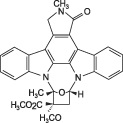Overview
Cat #:
K-250
Lyophilized Powder yes
Origin Nocardiopsis sp. (soil fungi).
Source Semi-synthetic
MW: 495
Purity: >98%
Effective concentration 500 nM - 1 µM.
Chemical name (9S,10R,12R)-2,3,9,10,11,12-Hexahydro-10-methoxy-2,9-di methyl-1-oxo-9,12-epoxy-1H-diindolo[1,2,3-fg:3',2',1'-k l]pyrrolo[3,4-i][1,6]benzodiazocine-10-carboxylic acid, methyl ester.
Molecular formula C29H25N3O5.
CAS No.: 126643-37-6
Activity KT5823 is a selective and potent inhibitor of PKG (IC50 = 234 nM)1,2.
References-Activity
- Kase, H. et al. (1987) Biochem. Biophys. Res. Commun. 142, 436.
- Hidaka, H. and Kobayashi, R. (1992) Annu. Rev. Pharmacol. Toxicol. 32, 377.
Shipping and storage Shipped at room temperature. Product as supplied can be stored intact at room temperature for several weeks. For longer periods, it should be stored at -20°C.
Solubility DMSO. Centrifuge all product preparations before use (10000 x g 5 min).
Storage of solutions Up to one week at 4°C or three months at -20°C.
Our bioassay
 Alomone Labs KT5823 inhibits PLCβ3 phosphorylation via PKG in C6 glioma cells.Cells were grown to 70% confluence, and then serum starved for 18 h. The cells were then preincubated for 30 min in different concentrations of KT5823 (#K-250) and stimulated with 8Br-cGMP (100 µM, 4h, 37°C) for PKG activation. Cell proteins were resolved by SDS-PAGE and probed with anti phospho-PLCβ3. PLCβ3 is a substrate of PKG.
Alomone Labs KT5823 inhibits PLCβ3 phosphorylation via PKG in C6 glioma cells.Cells were grown to 70% confluence, and then serum starved for 18 h. The cells were then preincubated for 30 min in different concentrations of KT5823 (#K-250) and stimulated with 8Br-cGMP (100 µM, 4h, 37°C) for PKG activation. Cell proteins were resolved by SDS-PAGE and probed with anti phospho-PLCβ3. PLCβ3 is a substrate of PKG.
References - Scientific background
- Kase, H. et al. (1987) B.B.R.C. 142, 436.
- Hidaka, H. and Kobayashi, R. (1992) Annu. Rev. Pharmacol. Toxicol. 32, 377.
- Chijiwa, T. et al. (1990) J. Biol. Chem. 265, 5267.
- Ruth, P. (1999) Pharmacol. Ther. 82, 355.
- Pfeifer, A. et al. (1998) EMBO J. 17, 3045.
- Chan, S.L, and Fiscus, R.R. (2003) Mol. Hum. Reprod. 12, 775.
Scientific background KT5823 is a semi-synthetic derivative of K525a.1 It is a potent, selective inhibitor of cGMP-dependent protein kinase (PKG) (in vitro IC50= 234 nM). KT5823 interferes at the level of the ATP binding site of the catalytic domain of PKG.2,3 The PKG are Ser/Thr protein kinase with broad substrate specificity, and expressed in; brain, smooth muscle cells, platelets, juxtaglomerular kidney cells, and endothelial cells.4,5 KT5823 triggered apoptotic DNA fragmentation in immortalized uterine epithelial cells, suggesting a regulatory role for PKG in the apoptotic process in these cells.6
Lyophilized Powder
KT5823 (#K-250) is a highly pure, semi-synthetic, and biologically active compound.
For research purposes only, not for human use
Last Update: 08/01/2025
Applications
Citations
Citations

